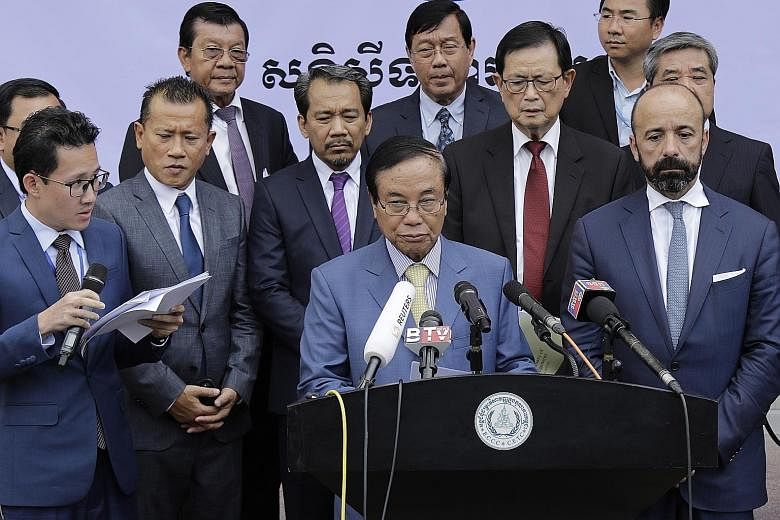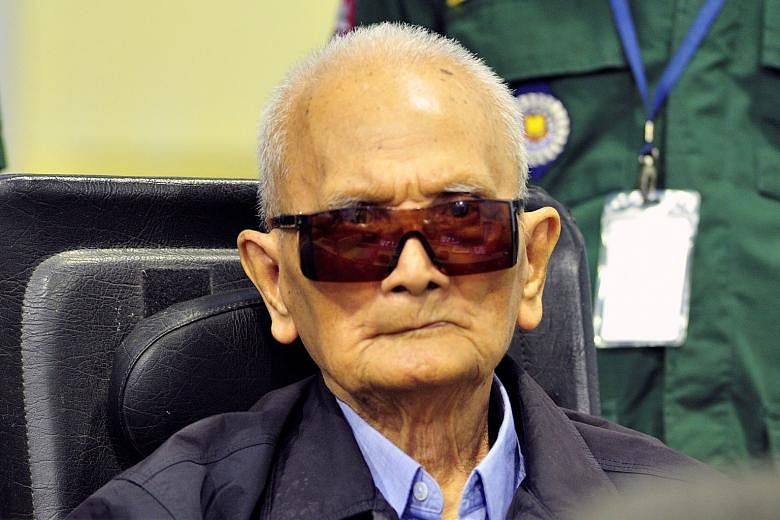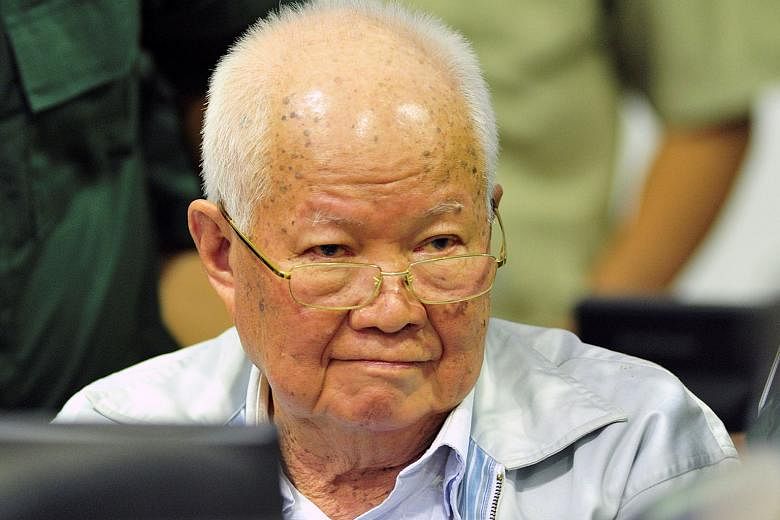ANLONG VENG (Cambodia) • Four decades after at least 1.7 million people, a fifth of Cambodia's population, died from execution, overwork, disease and famine - a world tribunal yesterday for the first time declared that it was genocide.
And it held the two most senior surviving members of the Khmer Rouge regime, Nuon Chea and Khieu Samphan, now 92 and 87 respectively, responsible for genocidal actions towards groups in Cambodia, including the Muslim Cham and Vietnamese.
In dry legal prose, the verdict did not camouflage the violent class struggle waged by the Khmer Rouge. It repeated certain words and phrases: murder, extermination, enslavement, imprisonment, torture, persecution on political grounds and other inhumane acts against human dignity.
Detailed instances of forced labour, such as the building of dams and dikes at the threat of death, were enumerated, along with forms of torture ranging from suffocation by plastic bags to the extraction of toenails and fingernails.
As the lengthy verdict was read out, Nuon Chea, asked to be allowed to listen to the proceedings in a holding cell rather than in the glass-enclosed courtroom.
For some, the verdict felt like a marginal footnote to a murderous history that has made Cambodia a byword for genocidal mania.
"It may be finished," said Madam Iam Yen, 52, who gave testimony to the tribunal of her years imprisoned in a child camp under the Khmer Rouge. "But I won't ever have peace."
Still, a verdict of genocide in Cambodia, no matter how delayed or limited in scope, carries implications for future prosecutions of crimes against humanity, such as in the cases of Sudan or Myanmar.
"We need to show the world that even if it takes a long time, we can deliver justice," said Dr Ly Sok Kheang, the director of the Anlong Veng Peace Centre.
For more than a decade, the UN-backed tribunal, called the Extraordinary Chambers in the Courts of Cambodia, has sifted through pages of documents, called hundreds of witnesses and heard in exhaustive detail how the Khmer Rouge ran its killing fields. The entire effort has cost more than US$300 million (S$413 million).
Yet the court has convicted just three senior Khmer Rouge leaders of crimes against humanity: Nuon Chea, Khieu Samphan and Kaing Guek Eav, known as Duch, who commanded a prison camp where at least 12,000 people were tortured and ordered to their deaths.
Only five top Khmer Rouge leaders have been arrested and put on trial. But as the court's deliberations dragged on, the other two elderly defendants died.
"This trial has frequently been a disgrace and a farce," said Professor Sophal Ear, who teaches diplomacy and world affairs at Occidental College in Los Angeles. But the "message is that you can be held to account, if you live long enough", added the professor whose family fled the Khmer Rouge."
Khieu Samphan, head of state during most of the Khmer Rouge years, and Nuon Chea, chief political strategist to the Khmer Rouge leader, Pol Pot, were arrested in 2007, after having spent years living freely in the country's north.
When handed life sentences in 2014 at an earlier trial for other crimes against humanity, both men denied responsibility.
Yesterday's genocide conviction came more than 40 years after the Khmer Rouge imposed its reign of terror on Cambodia. In 1975, Pol Pot and his communist forces marched into Phnom Penh and declared it "Year Zero". The aim was a classless agrarian society. People were executed for the slightest of crimes: wearing glasses, speaking French or liking ballet.
Mr Yun Bin, 63, said he was taken to one of the Khmer Rouge's killing fields, hacked with an axe and dumped in a well with others. To ensure no one lived, the soldiers threw grenades in the well, he said. Mr Yun Bin alone survived. To honour those who died in the well, he added his name as a civil party in the Khmer Rouge trials.
But many former Khmer Rouge members in Anlong Veng said they had no idea that a genocide verdict was imminent in Phnom Penh. Dividing the Cambodian population into binary good and bad halves is impossible, they said.
"We are all victims," said Mr Panh Sam Onn, who hid his background as a teacher to avoid being persecuted but he was soon drafted into the Khmer Rouge and rose from foot soldier to district chief.
NYTIMES



